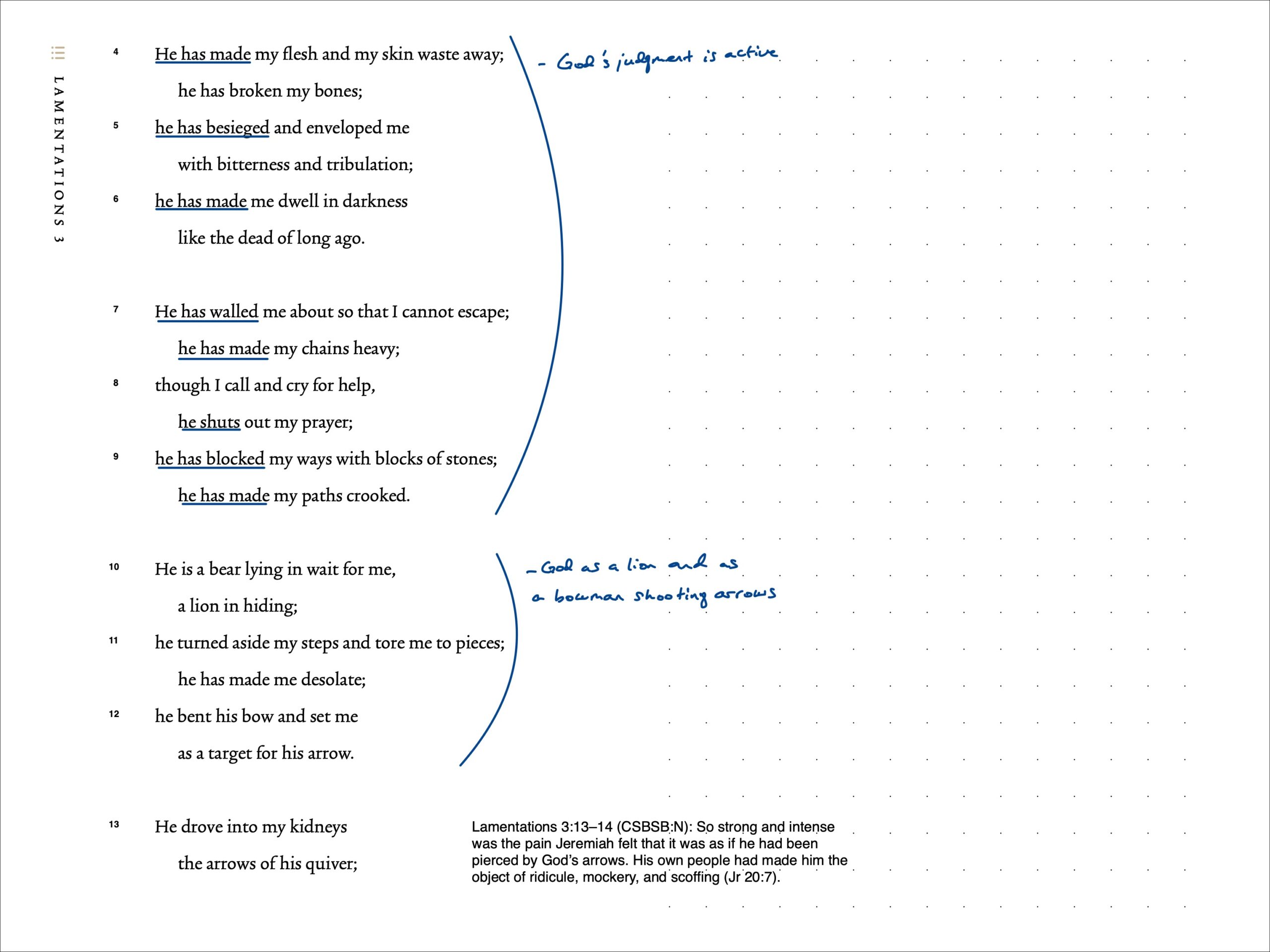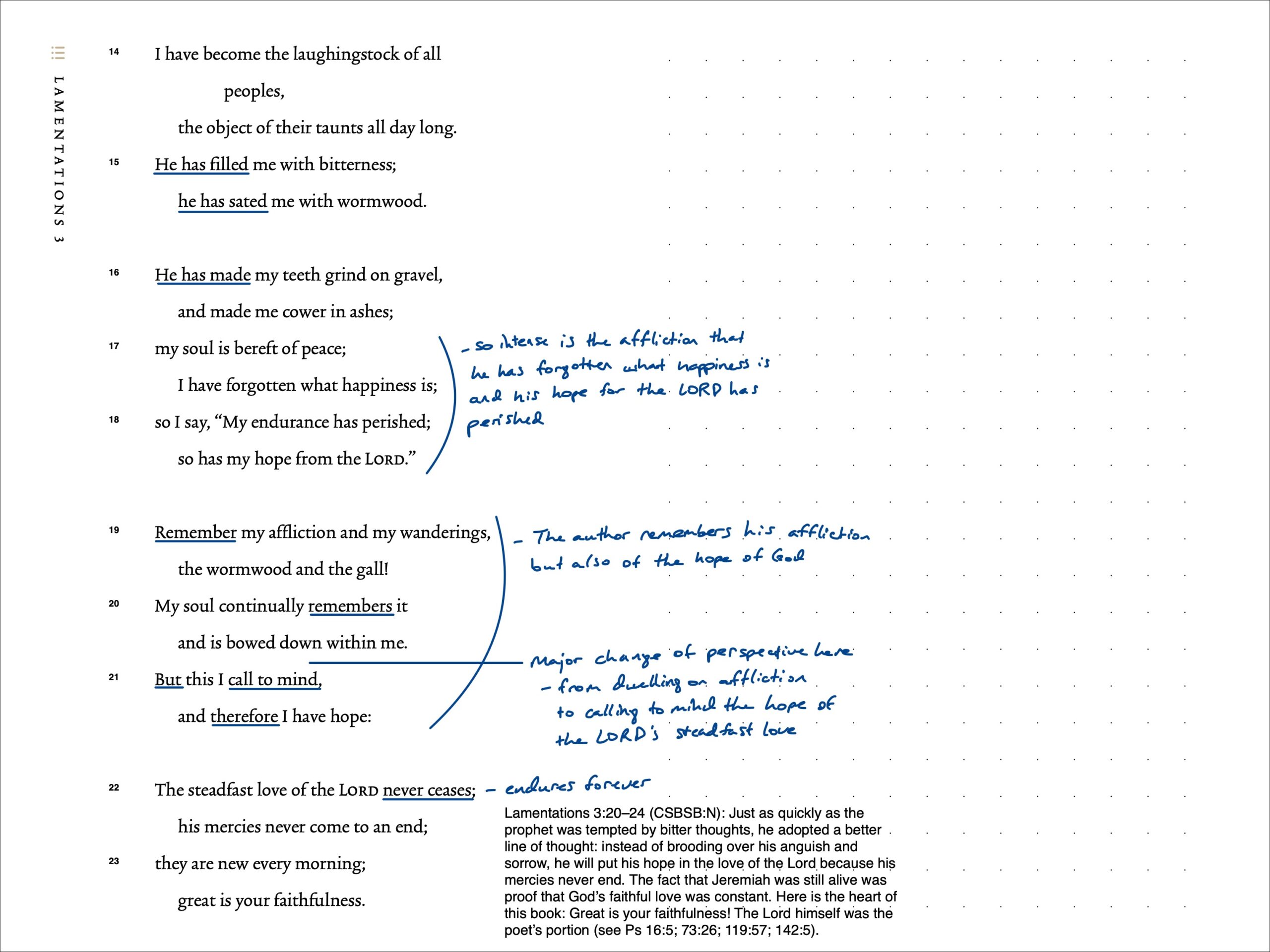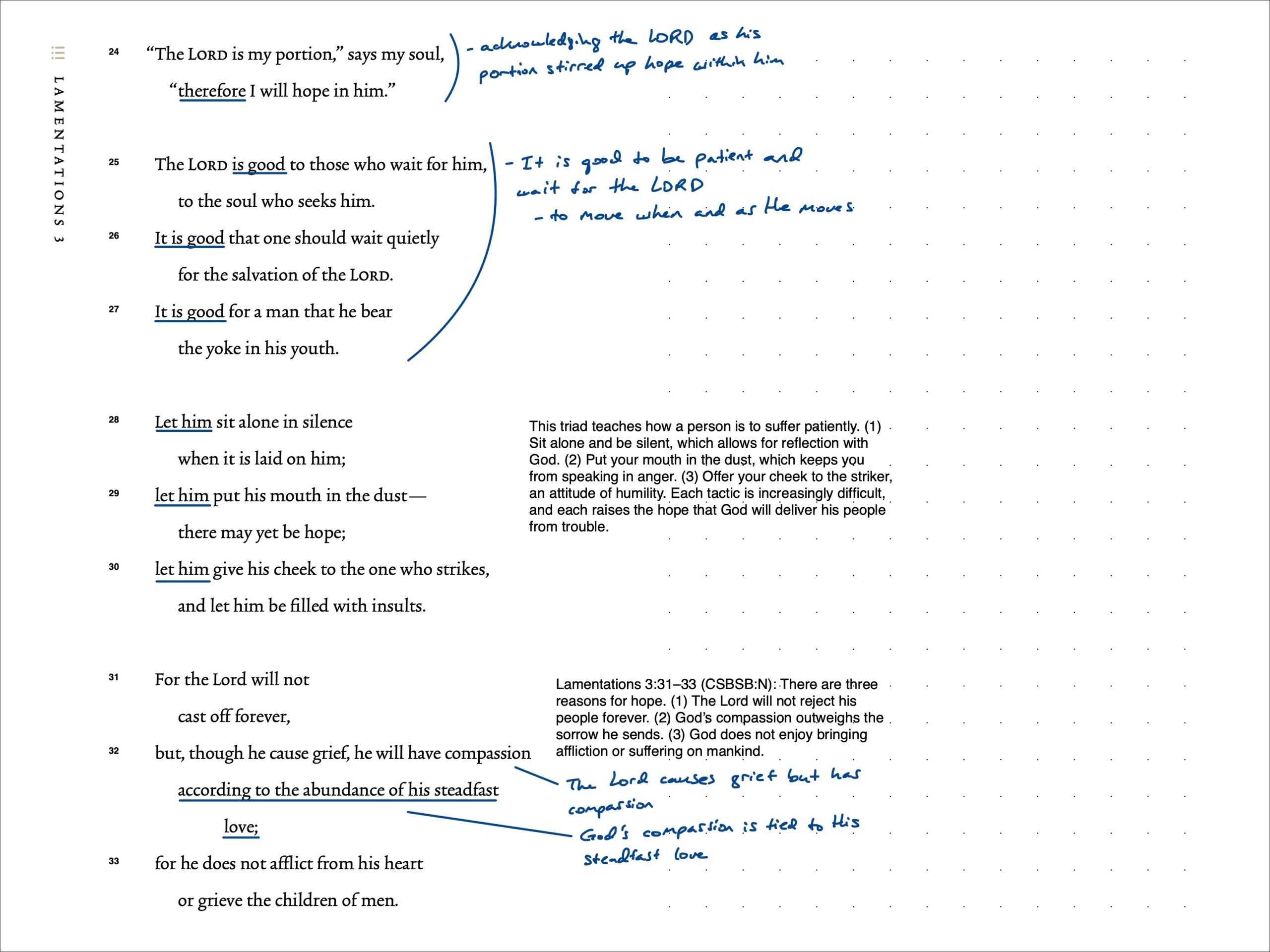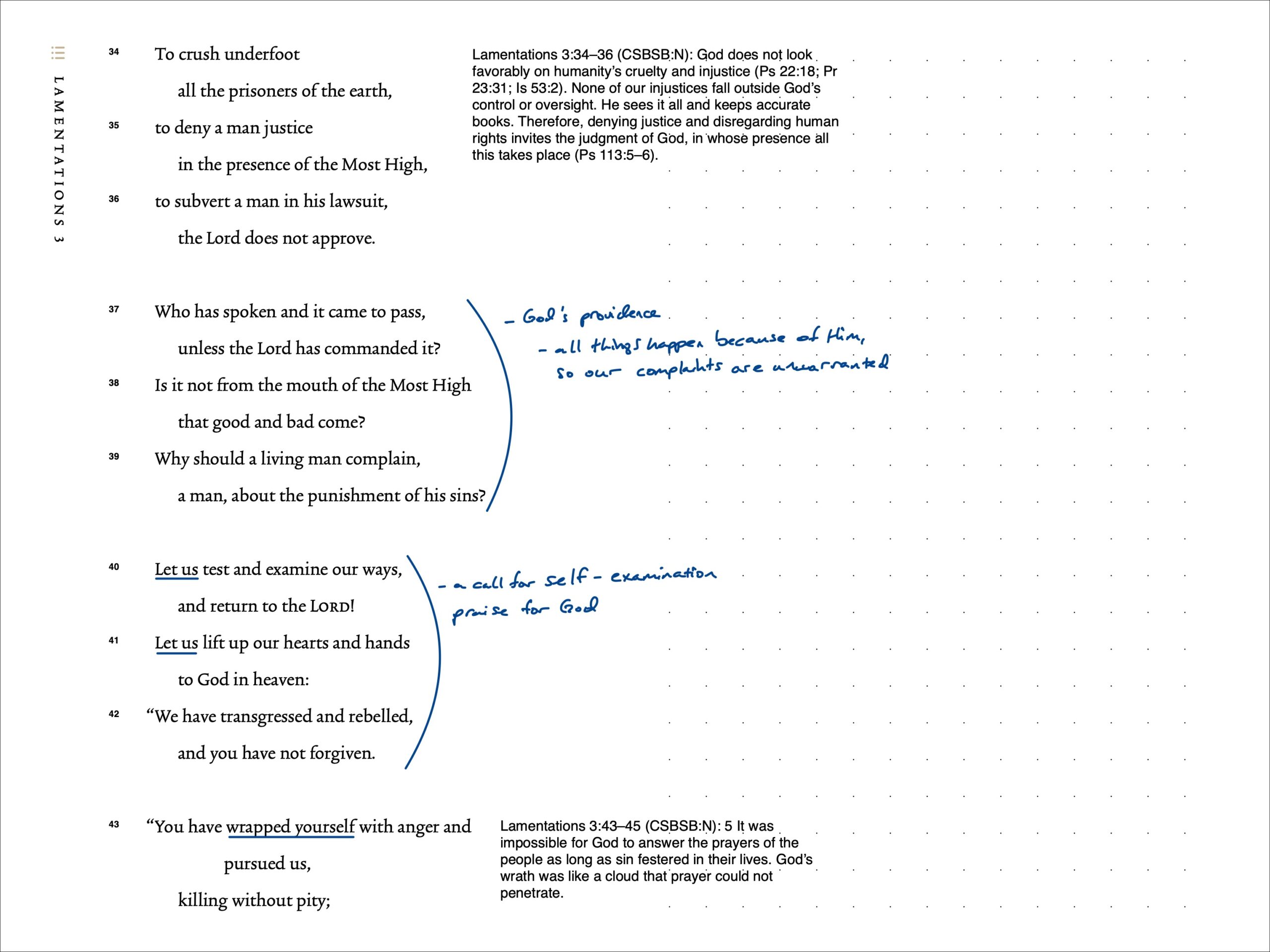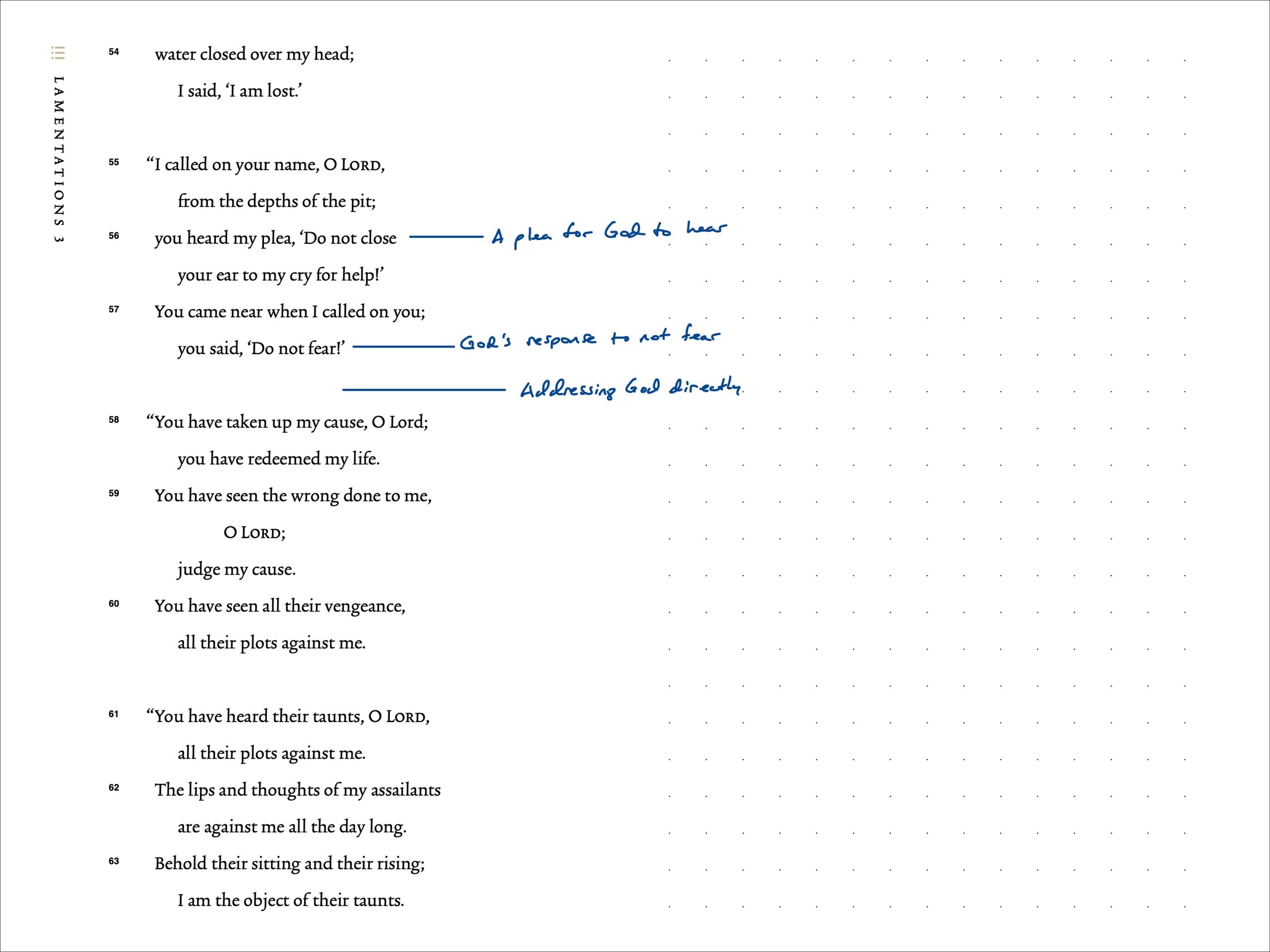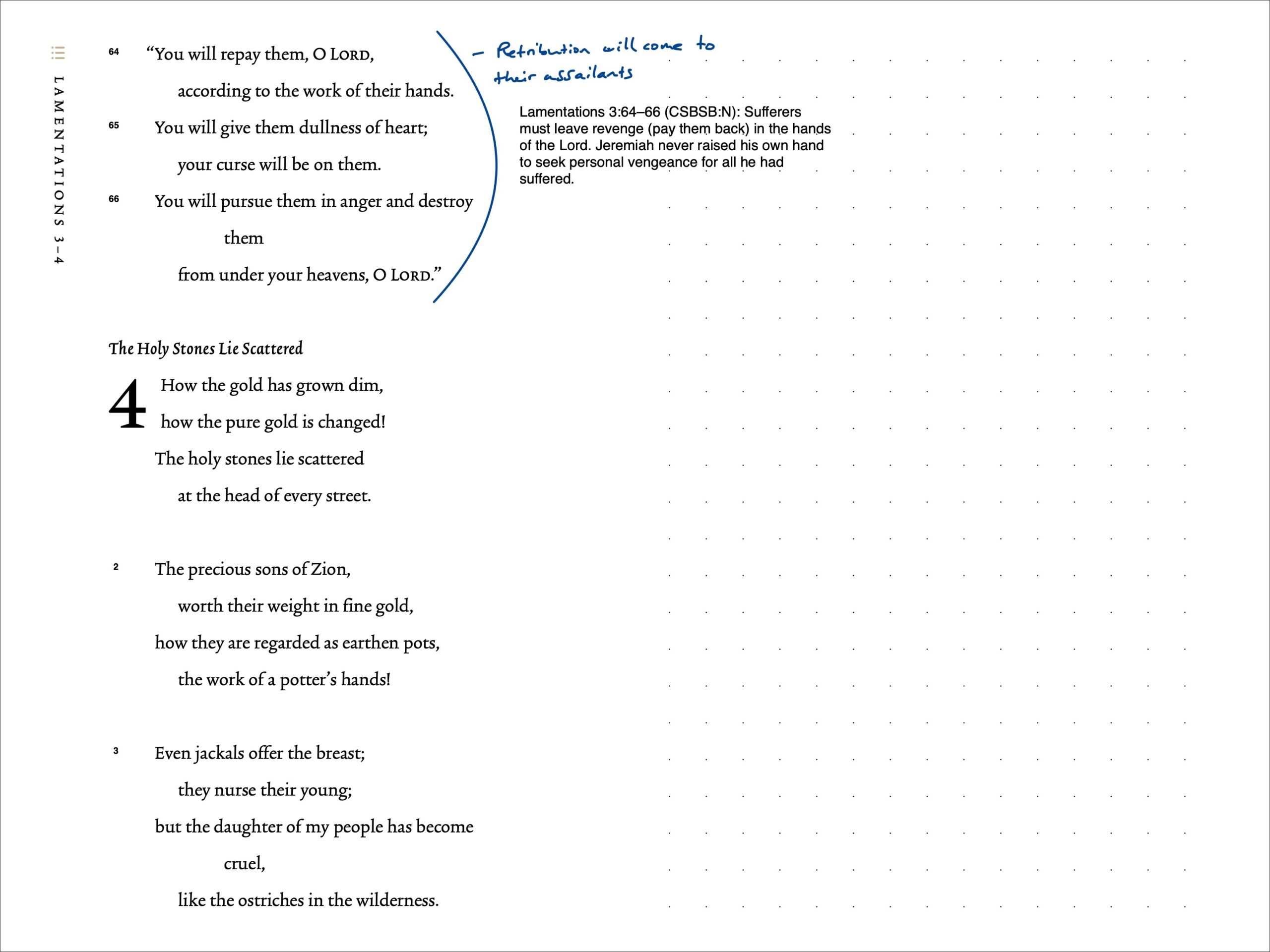| Date | Version | Reading Plan |
|---|---|---|
| @August 18, 2023 | ESV (2016) | ESV Prophets Plan 2023 |
Pericopes
- Great Is Your Faithfulness
Notes
The chapter opens with “the man who has seen affliction”, a male voice of individual lament contrasting the female voice of Zion’s lament in Lam. 1:12-22. The term for “man” frequently occurs in wisdom context (15x in Job; 4x in wisdom psalms), linking this opening lament with the sage-like teaching in Lam. 3:25-39.
Lam. 3:4-9 depicts God as active in His judgment against Jerusalem, making “skin waste away”, breaking bones, enveloping with bitterness and tribulation and the like.
Lam. 3:10-13 portrays God as a lion and as a bowman shooting arrows. So strong and intense was the pain of Jeremiah’s lament that he felt as if he had been pierced by God’s arrows. His own people made him the object of ridicule, mockery and scoffing (Jer. 20:7).
Lam. 3:17-18 continues in this lament that the author has forgotten what happiness actually is and both his endurance and hope from the LORD had perished.
In Lam. 3:19-21, the author recalls his affliction but, in doing so, calls to mind the hope of God. It is a major shift of perspective from dwelling on their plight to looking to God and His goodness.
Lam. 3:20-24 are of this better line of thought where the prophet is no longer tempted by bitterness. Instead of brooding over his anguish and sorrow, he will put his hope in the love of the LORD because His mercies never come to an end and are “new every morning” (Lam. 3:23). The fact that Jeremiah was still alive was proof that God’s faithful love was constant. This is the very heart of the book: great is God’s faithfulness.
Lam. 3:25-27 is of the goodness to be patient and wait for the LORD, to move when He moves. One should “wait quietly for the salvation of the LORD” (Lam. 3:26), endure well through suffering and “bear the yoke of his youth” (Lam. 3:27)
Lam. 3:28-30 continues in the form of suffering patiently, to 1) sit alone in silence and reflect on God, 2) put your mouth in the dust and keep from speaking in anger and 3) offer your cheek to the striker, expressing an attitude of humility. Each tactic is increasingly difficult but each raises the hope that God will deliver His people from trouble.
Lam. 3:31-33 gives three reasons for hope in God: 1) the LORD will not reject His people forever, 2) God’s compassion outweighs the sorrow He sends and 3) God does not enjoy bringing affliction or suffering on mankind. God indeed causes grief, but it is with great compassion (Lam. 3:32).
Lam. 3:34-36 is of how God does not look favorably on humanity’s cruelty and injustice (Ps. 22:18; Prov. 23:31; Isaiah 53:2). None of our injustices fall outside God’s control or oversight. He sees it all and keeps accurate books. Therefore, denying justice and disregarding human rights invites the judgment of God, in whose presence all this takes place (Ps. 113:5–6).
Lam. 3:37-39 is on God’s providence and that all things happen because of Him. Because of this, we have no cause or warrant for complaint. There is no excuse for a living man to complain “about the punishment of his sin” (Lam. 3:39)
Lam. 3:46-51 are a lamentation over the destruction brought on by Judah’s enemies. Panic and pitfall have come upon them and their “eyes flow with rivers of tears” (Lam. 3:48). This grief will continue until the LORD looks down from heaven and sees it (Lam. 3:50).
Lam. 3:55-57 are of the author’s calling on the LORD’s name “from the depths of the pit”. He pled for God to hear and God responded by coming near and saying, “Do not fear” (Lam. 3:57)
The remaining verses (Lam. 3:58-66) are of a direct address to the Lord by the author, that He has taken up his cause and redeemed his life (Lam. 3:58-59). God has seen all their plots against him, hearing their taunts and that their lips are against him “all the day long” (Lam. 3:60-62). Retribution will come to Judah’s assailants by way of the Lord. Revenge is never to be untaken personally but must always be left in God’s hands.
Application
This is such a great chapter for modeling a God-centered focus in the midst of suffering. Detailed is the account of affliction of Jeremiah and Judah in the first 20 verses, but then a shift happens. In a moment, the author moves his gaze from his grim predicament and onto the Lord and says, “But this I call to mind”.
Am I so filled with the truth of God’s goodness that I am able to look up to Him in the middle of the fire? Can I call to mind His steadfast love in moments of failure, relational conflict or when deeply convicted by indwelt sin? How can I be so saturated with Him that, when squeezed, I immediately look to Him? I am gripped with these questions as I read this chapter.
Praise be to God that His love and goodness covers all. His mercies never end, they are renewed every morning. My endurance may perish but His never will. What a wonderful reality in which we live and a gracious God we get to worship.
Scripture Journal Notes
Commentaries & Resources Used
- ESV Study Bible. (Wheaton, IL: Crossway, 2008)
- Faithlife Study Bible (Lexham Press, 2016)
- Believer’s Bible Commentary (Thomas Nelson, 2016)
- CSB Study Bible Notes (Holman Bible Publishers, 2017)
- Matthew Henry’s Commentary on the Whole Bible (Guardian Press, 1976)
- The Bible: A Reader’s Guide (Sterling Publishing, 2011)
- The Infographic Bible (Zondervan, 2018)
- ESV Digital Scripture Journal (Crossway, 2019)

